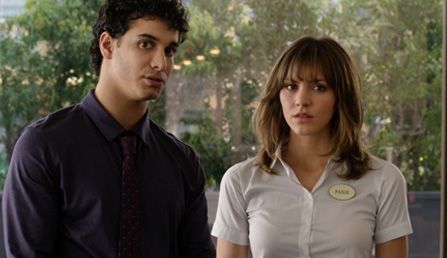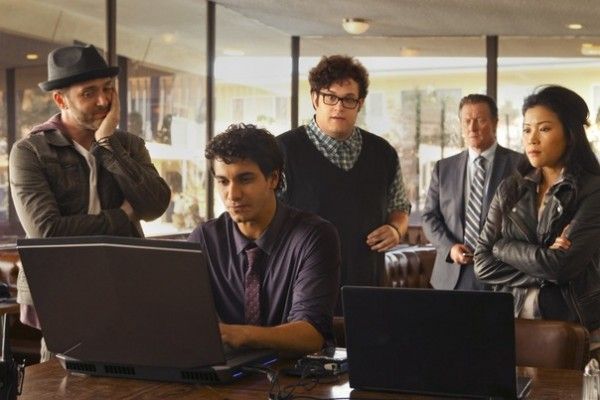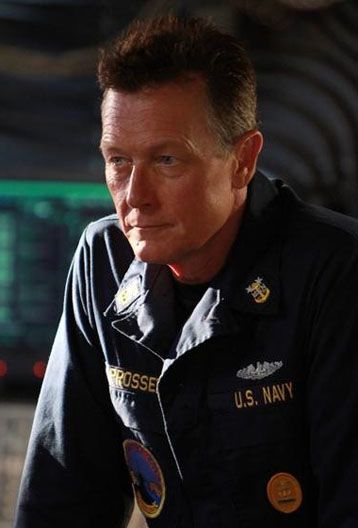CBS is bringing to life the incredible stories of real-life genius, Walter O’Brien and his team of equally gifted individuals, this fall with their new show, Scorpion. After their first appearance as a cast at Comic-Con, where they also screened the pilot’s premiere, the cast and producers sat down for round table interviews with the press.
The real O’Brien, who also serves as executive producer on the show, was on hand to discuss how the idea for a series came about and what motivated him to move on with the project. During our conversation, the cast: Robert Patrick, Elyes Gabel, and Katherine McPhee, gave us some insight into their characters and the producers (Alex Kurtzman, Roberto Orci) revealed what viewers can expect to see on a weekly basis and why we should all watch. Hit the jump for more.
What can you tell us about the show to get viewers to tune in?
ALEX KURTZMAN: Einstein’s IQ, 160—idiot, compared to the lead of our show whose IQ is 197. It’s about the smartest guy in the world and his team of geniuses. To even work with him, you need to have an IQ of 160, and these cases are real, his life, how you meet him. He really was a kid at 12 years old hacking into NASA before anyone knew what hacking was. This is the original genius computer hacker that ever existed. This show is based on the real life of this guy and the real formation of his company. It’s rare to have a show based this much on reality but is also this escapist.
Will all episodes be based on real cases that Walter O’Brien solved or will you guys make up some things?
ROBERTO ORCI: It will certainly have a component of something real. There will be many episodes based on real cases that Walter’s gone through.
KURTZMAN: He’s got more stories than we have episodes so far. Right now, we’re just catching up on the stories he’s telling us. Eventually, we’re gonna say, “Hey dude, we have an idea too.”
ORCI: One of the many things that got us so excited about it wasn’t just the obvious cases and the fact that they were real and grounded. It’s this idea that Walter talks about, the higher the IQ the lower the EQ. The more intelligent you are, the lower your ability is to communicate emotionally with people, particularly when you’re that brilliant. What you’re watching is a lot of people trying to figure out how to fit in.
For a million reasons they’ve been ostracized, they’ve been often misdiagnosed as being slow. It’s really about a group of people who are realizing how important it is to find a surrogate family because often times their own families have not known what to do with them. They’ve kind of rejected them. They come together as a family and are learning to communicate with the outside world at a more emotional level. That’s a really interesting thing to watch our characters do.
Can you give us any hints about any of the stories you will be talking about during the season?
NICHOLAS WOOTTON: We’re doing a bombing episode, we got a bomber, which is something that Walter’s done in his company. We’re doing a show about biohacking, which is about implanting a disease onto a single strand of DNA that can attack only one person, which is something that’s out in the world right now. And we’re working on a casino heist. We’re doing a lot of things, a lot of big stuff, things that Walter’s worked on, things that are going to be influenced enormously by new technology and things that Walter works with—all that kind of fun stuff.
How much freedom do you have to talk about cases like these?
NICK SANTORA: Walter’s very clear with us. The way he phrases it is, “If I’m telling you about it, it means you’re allowed to hear about it.” Walter does stuff that we’re not allowed to hear about, works with clients that want confidentiality, and Walter respects that. Once something is allowed to be discussed, Walter is incredibly open. He’s open and generous with his time and his intellect to help us with technological issues in scripts, and he’s also open about personal issues.
He’ll talk to us very openly about how it was tough being a kid with a genius IQ and other kids like to make fun of the smart kid, and things of that nature. This show doesn’t get made without Walter and even if you somehow make a show about geniuses without Walter, it would stink. Except for Big Bang Theory which is a show about geniuses, which is great. You know what I meant.
How do you deal with character development and growth in an episodic set up as opposed to serialized?
SANTORA: The character stuff will be serialized in that each week you’re going to see these characters grow in their relationships and what we learn about them in their past, stuff we never even knew about them. That’s gonna come out each week and we’re big believers in doing it with an eye drop—a little taste each week with whatever character we’re focusing. And in the next week get a little bit more for a really nice arc that comes out over an entire season. The way we can do that is by having an adventure each week for this team that affects and reflects on them in a way that brings out that character.
Walter, what did you think when they brought up the idea to create a show about you?
WALTER O’BRIEN: Well, originally I brought the idea to them because this show is done very deliberately for a couple of reasons. To raise the awareness that there is a group of us that exists that can be brought in to solve problems other people can’t solve. Also, to raise the awarenesses for other geniuses out there to come out of the closet and come join us to do more good for the greater good of the planet. We decided to make this show—my company—and then went out and reached out to Scooter Braun, CAA, Perfect Storm, and then brought in the best directors and writers and producers to work together. It was very deliberate.
Is there a particular episode that really hits close to home?
O’BRIEN: The first one. The pilot episode brought back memories from when I was a kid, when this all started to memories of bad break ups dating, to the air traffic control crisis. That all brought back memories. With the others, we’re working on the scripts. Maybe I haven’t been in TV long enough but it’s when I first see it on screen that it really hits me. I haven’t been able to make that leap from the script yet. Seeing the script and then seeing the show is not the same thing to me yet.
What made you want to play these characters?
KATHERINE MCPHEE: For me, I’ve never played a mother before but—not to say Karen wasn’t a real character on Smash but I wouldn’t say that they continued to write her as a woman with strength. I think they played into Karen more as a weaker, young girl. Now I feel like I’m more of a woman, someone who is really self sufficient and who takes care of her son and has a lot of responsibility and a lot of things on her shoulders. I felt like a real character. And then there’s this whole action side that I thought would be really great to be able to do.
ELYES GABEL: I was really attracted in a strange way to playing—I like consistent characters and choices. Playing somebody who doesn’t have the ability to communicate with somebody else. Essentially, the biggest personality trait that the pilot suggests Walter has is an inability to empathize. To be able to communicate that and to be able to have a character who’s not the heart—because all these character are really important, interesting, and they breathe life into the show. But to have a character who you see things through is a challenge because you’re like, “Why do I care about this guy if he doesn’t have the ability to communicate?” You have to find the conflict in that.
Was working with the real Walter intimidating?
GABEL: It’s not so much intimidating because one great thing about Walter is he’s very open to communication. It’s not the fact that he’s trying to show you how intelligent he is. It’s more of the fact that he’s disseminating, he’s explaining things but to a heightened intellectual and very quick processing degree. He’s a computer, just flicking through.
MCPHEE: Also just conversing with him when you’re trying to figure out how quickly he’s processing things and what exactly he’s thinking about me or the person he’s in a conversation with like, “Do you think I’m really stupid?” When I first met him I was drinking too much coffee, I was bouncing off the walls and he said immediately that I was ADD, within like 30 seconds of meeting me. Because I would ask him a question and before he could finish answering, I would ask him another question. Which is something I do in real life.
Can you tell us a little bit about your character?
ROBERT PATRICK: Cabe Gallo is a federal agent, he’s looking for a hacker named Scorpion. He finds him in Ireland and lo and behold, he’s a young boy. The more he finds out about him, he finds out he’s incredibly brilliant, realizes what an asset he would be to the United States government and he takes him away from his family and puts him to work for the greater good.
Were you still filming From Dusk till Dawn when you got approach for this?
PATRICK: Thank you for that question about From Dusk till Dawn. Yes, I was. It became apparent to me when I was looking at the scripts of From Dusk till Dawn, in the movie I die. My character, Harvey Keitel’s character dies, so I went to Robert [Rodriguez] and said, “Hey man, I’m gonna die aren’t I?” And he went, “Yeah.” And I said, “Do you mind if I go do this project Scorpion for CBS?” He said, “No.” He let me go, isn’t that great? From Dusk till Dawn is a great show, I was really thrilled. I loved working with Robert, it was a great opportunity to work with him again. I hadn’t worked with him in like 15 years. I’ve grown as an artist and he’s grown as an artist. To be able to show an old friend a whole bunch of new aspects to your craft, it was great. Great experience, I love Robert.




